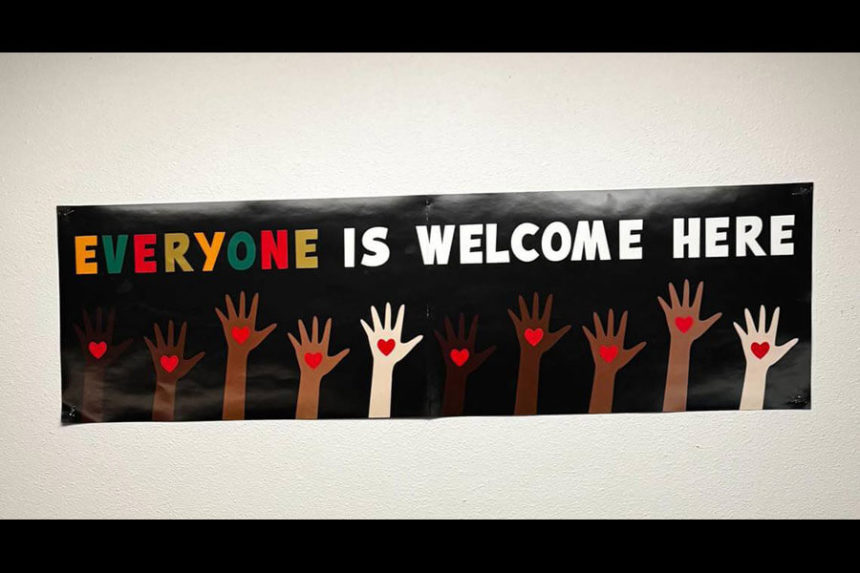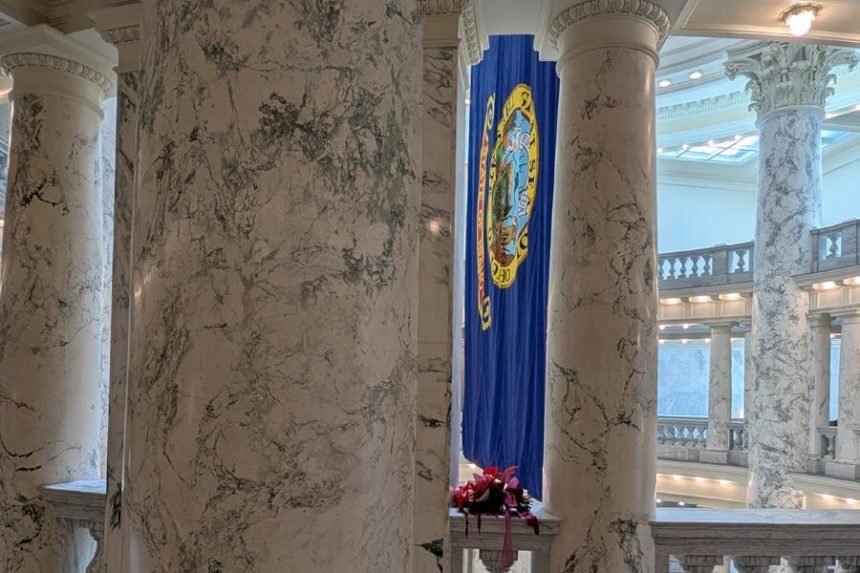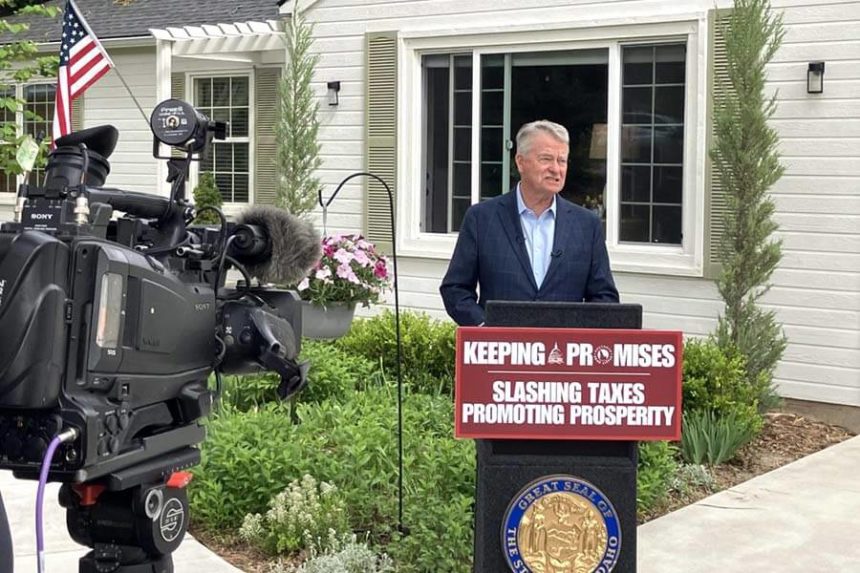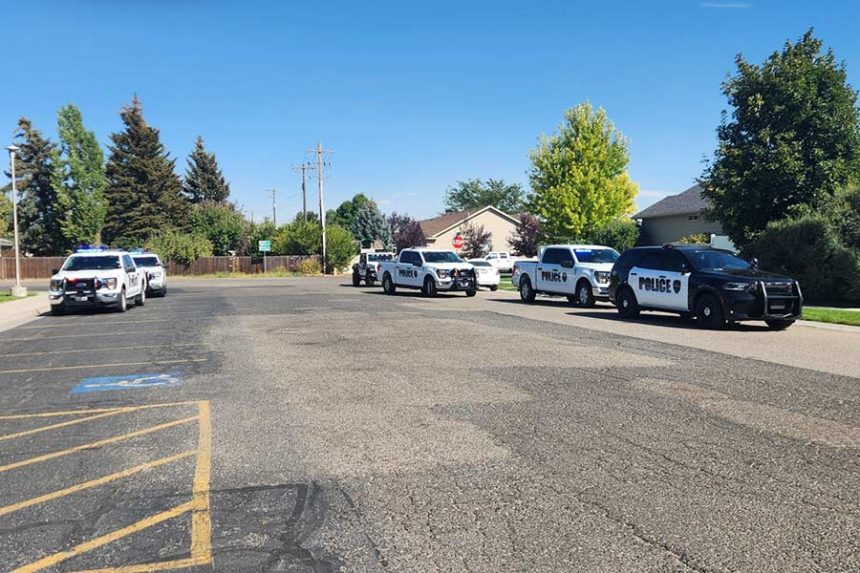BOISE (Idaho Ed News) An Idaho attorney general’s office ruling issued late Friday states that schools in Idaho are no longer allowed to display the Everyone is Welcome Here sign that caused a national controversy.
A day after Idaho EdNews obtained a redacted copy of the opinion—which the Idaho Department of Education used to draft its guidelines on the flags-in-schools law—the disclosure was made public.
House Bill 41, which takes effect on Tuesday, forbids public K–12 schools from displaying banners or flags that express a political opinion. Teachers and school administrators had concerns about the law because of its ambiguous wording.
On March 28, the IDE requested advice on the new law from the attorney general’s office. The attorney general’s office did not respond until May 29. After that, it took the department almost a month to provide school districts advice, which it finally did on Thursday.
According to the guideline, school personnel are not allowed to fly flags or banners that express feelings, ideas, or opinions regarding politics, the economy, society, faith, or religion. These terms were not defined in the advice or the attorney general’s decision.
One part of the attorney general’s opinion, which was made public to EdNews on Thursday, was redacted. It concerned posters that Sarah Inama, a teacher in the West Ada School District, had been displaying in her classroom for years. “Everyone is Welcome Here” was written on one sign.
Administrators at West Ada claimed that the signs, one of which showed open hands with various skin tones, were against district rules. Inama’s tale garnered national media attention in March after she refused to take down the placard.
RELATED | A teacher in Idaho was instructed to take down placards that advocated for diversity. There was controversy.
RELATED | Hundreds gather in Boise to support an inclusive classroom poster phrase that ignites a movement
The attorney general’s office was questioned by the IDE about whether Inama’s signatures in particular were against the new law.
Yes, according to the attorney general’s office.
According to the attorney general’s statement, these placards are a part of a social and ideological movement that began in Twin Cities, Minnesota, when Donald Trump was elected president in 2016. The Democratic party has been using the signs as a political statement ever since. In order to raise money, the Idaho Democratic Party even sells these signs.
A news report from a Minnesota television station from 2017 about a group of women uniting against hate after racist graffiti surfaced at Maple Grove High School the day after Trump’s 2016 election is then linked in the opinion. “Everyone is Welcome Here” is what their signs say. The initiative’s leaders told the TV station that their nonpartisan, secular campaign was about fighting bigotry.
According to the narrative, the placards were well-liked at schools in Minnesota.
After Inama’s tale went viral, the Idaho Democratic Party didn’t start selling the signs until March 25, according to communications director Avery Roberts. According to Roberts, the placards and stickers are offered for sale almost at cost and serve as a means of promoting inclusion and Inama rather than as a means of generating revenue.
Regardless of their political views, educators and parents throughout the state want students to have equal opportunities. Roberts noted in an email to EdNews, “They’re working hard to build strong public schools where every student feels welcome and has the support they need to succeed.” The message is what counts. We hope that leaders from both parties will recognize that opposing discrimination shouldn’t be a partisan issue.
RELATED | An Idaho student addresses the district poster controversy during a graduation speech by deviating from the script.
RELATED | Teenagers in New York create a painting at school that is modeled after Idaho
The opinion continued by stating that Inama started hanging the placards in 2017, not long after Trump’s first election, and that she claimed to have done it in order to express her ideological and personal views.
“I wasn’t even a teacher in 2017, and I didn’t put the signs up until 2020 or 2021,” Inama told EdNews in an interview on Monday. Before EdNews handed her the attorney general’s ruling on Friday, she had never heard of the Minnesota story and had purchased the sign from a craft store in the Boise area.
According to Inama, the piece provides solid proof that this message is non-political. These mothers, who do not belong to a political party, created these signs in an effort to fight bigotry. The statement “Everyone is Welcome Here” is not at all indicative of a political organization.
Inama continued by saying that inclusive messages are not political, particularly since public schools are required by state and federal law to embrace all students and refrain from discrimination.
According to Inama, the public school system’s policy of “Everyone is Welcome” is mandated by law and is not political.
RELATED | A teacher in Idaho quits signs in the classroom. This is what she said to school administrators.
According to Inama, inclusive sayings are not new in public schools. Signs that read “All are Welcome” or “Everyone is Welcome” were frequently used to reassure children that they were secure, accepted, and prepared to study while she was a student.
It can be found anywhere. According to Inama, it’s a very universal message rather than a political viewpoint.
Dozens of Boise School District administrators and educators wore Everyone is Welcome Here T-shirts in a social media post after Inama’s KTVB interview.Inama was hired by Boise to teach there for the upcoming academic year.
At 5:30 p.m. on Friday, the IDE made the decision to make the unredacted attorney general’s opinion public. The agency has not yet responded to a request for comment and did not provide an explanation for the timing.
Go here to read the entire opinion.
Originally published on June 30, 2025, on IdahoEdNews.org












